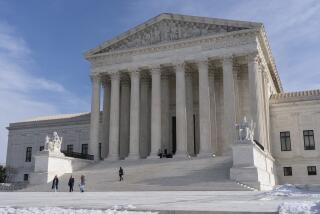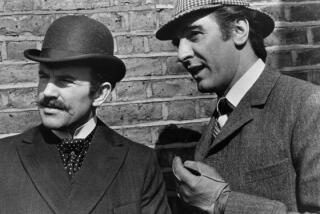Judge revives Viacom copyright suit against YouTube
- Share via
A federal appeals court judge has revived a $1-billion copyright infringement lawsuit by Viacom Inc.against Google Inc.’sYouTube, reopening a high-profile clash between old and new media.
The dispute — which began when established media conglomerates were struggling to cope with the disruption of online video — reflected a frantic effort by Viacom to halt unauthorized snippets of its TV shows from showing up online.
Ironically, the ruling, which revives the 2007 legal conflict, comes in the same week that YouTube announced an online movie distribution agreement with Viacom-owned Paramount Pictures. That deal, which allows YouTube users to rent and watch Paramount films, illustrates the mainstream legitimacy of YouTube as a digital media platform. Five of the six Hollywood studios now rent out titles through YouTube.
But when Viacom sued YouTube, that wasn’t the case. The media company claimed YouTube allowed users to post tens of thousands of clips of its popular TV shows, including Comedy Central’s “The Daily Show” and Nickelodeon’s”SpongeBob SquarePants,” without authorization from 2005 to 2008.
A U.S. District Court ruled in favor of YouTube in 2010, saying the online service was shielded from copyright infringement liability by the “safe harbor” provision of the Digital Millennium Copyright Act.
U.S. 2nd Circuit Court of Appeals Judge Jose A. Cabranes wrote Thursday that the safe harbor provision protects Internet services from liability if they lack specific knowledge of a piece of infringing material — and act quickly to remove it once notified. However, he sent the Viacom case back to the District Court and instructed the judge to determine whether YouTube knew about the unauthorized use of copyrighted works or turned a blind eye to infringing activity.
The federal appeals court asked the District Court judge to reconsider the extent of YouTube’s knowledge with respect to certain English Premier League soccer footage, prime-time television shows, Bud Light commercials and broadcast footage referred to in corporate email exchanges and correspondence dating from 2005 through 2007.
In one such email exchange cited, YouTube founder Chad Hurley urged his colleagues to “start being diligent about rejecting copyrighted/inappropriate content,” noting that a CNN clip of the space shuttle was on the site, asking whether “the boys from Turner” might be angry.
Co-founder Steve Chen resisted, writing, “we should just keep that stuff on the site,” adding that the clip could be removed after YouTube received legal notice.
The correspondence suggests YouTube knew about the alleged infringement.
“On these facts, a reasonable juror could conclude that YouTube had actual knowledge of specific infringing activity, or was at least aware of facts or circumstances from which specific infringing activity was apparent,” Cabranes wrote.
The appellate court found the district court erred in granting a summary judgment in favor of YouTube “despite evidence that YouTube “was ‘willfully blind’ to specific infringing activity,” Cabranes wrote. The judge asked the lower court to determine whether YouTube made “a deliberate effort to avoid guilty knowledge.”
Both sides found something to cheer about in the decision.
Viacom said, “The court delivered a definitive, common sense message — intentionally ignoring theft is not protected by the law.”
Doug Lichtman, a professor of law at UCLA who advised Viacom in the case, said the judge’s clear message was that online service providers “cannot turn a blind eye to the infringing activity they facilitate.”
YouTube sought to minimize the effect of the ruling.
“All that is left of the Viacom lawsuit … is a dispute over a tiny percentage of videos long ago removed from YouTube,” the company said. “YouTube will continue to be a vibrant forum for free expression around the world.”
The NetCoalition, a group that represents Internet and technology companies, including Google, Yahoo, Amazon.comand Wikipedia, hailed the appeals court ruling for finding that Internet companies cannot be held liable for damages without actual, specific knowledge of infringement.
“NetCoalition is pleased that the 2nd Circuit has held, consistent with prior case law, that Internet companies are not liable for damages when they do not have actual, specific knowledge of the infringing content in question,” NetCoalition Executive Director Markham Erickson said in a statement. “The decision allows Internet companies to continue to rely on a legal framework that has fostered unprecedented growth and innovation, creating one of the truly bright spots of the U.S. economy.”
More to Read
Inside the business of entertainment
The Wide Shot brings you news, analysis and insights on everything from streaming wars to production — and what it all means for the future.
You may occasionally receive promotional content from the Los Angeles Times.










